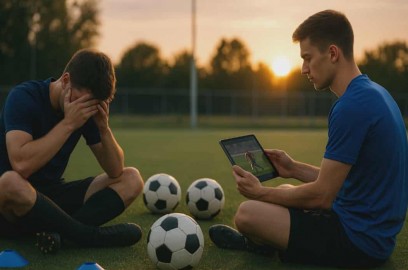
Most ambitious players believe that the more they train, the faster they will become better.
It seems logical – “more = better.”
But in football, it’s not the number of hours that matters most, it’s the quality, awareness, and effectiveness of your training.
Many young players put in enormous effort every day, yet they don’t develop proportionally to the work they invest. They feel stuck, even though they “work harder than others.”
Why does this happen?
-
MORE DOESN’T MEAN BETTER
A footballer’s body has limited recovery capacity.
Every training session is a form of stress – for the muscles, the nervous system, concentration, and the mind.
When the training load exceeds the body’s ability to recover, progress stops.
Instead of improving, you experience fatigue, frustration, and stagnation.
Professional players train every day, but their plan is balanced:
-
one day of high intensity,
-
another focused on technique or recovery,
-
all monitored by fitness coaches and specialists.
Amateurs often try to copy this structure without understanding it. The result? Overtraining, micro-injuries, decreased performance, and loss of motivation.
-
QUALITY TRAINING = FOCUS + PURPOSE + FEEDBACK
Training should never be a random collection of exercises.
Every session needs a clear purpose, for example:
-
improving 1v1 attacking situations,
-
making more accurate passes under pressure,
-
becoming more effective at changing direction with the ball.
If you don’t know why you’re doing an exercise, you’re wasting time.
Training without a goal is just “burning energy.”
Players who improve the fastest have a feedback system – they record their sessions, analyze videos, or consult experienced coaches.
That’s what separates those who “train a lot” from those who actually get better.
-
MICRO DETAILS MAKE THE DIFFERENCE
Smart training means focusing on small details that create big advantages on the pitch:
-
how you position your foot when receiving the ball,
-
where you direct your first touch,
-
how quickly you react after losing possession,
-
whether you move after passing.
Instead of running aimlessly for 90 minutes, spend 45 minutes mastering one specific technical skill with full concentration.
That’s how players who are ready for the professional level at 18–20 years old train.
-
RECOVERY IS PART OF TRAINING, NOT A BREAK
Many players ignore the most important part of progress – recovery.
Muscles don’t grow during training – they grow during rest.
The nervous system restores itself during sleep.
If you sleep only 5–6 hours and train every day, your body never rebuilds properly.
It’s like trying to charge your phone while half unplugged – it’s always on, but never fully charged.
Professional players treat sleep, nutrition, and recovery as mandatory parts of their training plan, not as optional extras.
-
WHAT SMART TRAINING LOOKS LIKE IN PRACTICE
Here’s an example of a simple weekly structure for a player who wants to develop efficiently:
-
MONDAY: Technical training (first touch, dribbling, ball control)
-
TUESDAY: Strength + power (functional training, core, sprints)
-
WEDNESDAY: Active recovery (stretching, mobility, match analysis)
-
THURSDAY: Tactical training / small-sided games 3v3 or 5v5
-
FRIDAY: Reaction and perception speed
-
SATURDAY: Match or match simulation
-
SUNDAY: Rest and video analysis
This plan combines different aspects of the game but leaves time for recovery and reflection.
-
TRAIN WITH YOUR HEAD, NOT JUST YOUR EFFORT
Ambition is powerful, but not enough.
Professionalism begins when you learn to manage your own development:
-
you plan your sessions,
-
analyze your results,
-
rest when needed,
-
focus on quality, not quantity.
It’s no coincidence that many of the best players in the world train less than others – but every minute of their work has purpose.
SUMMARY
If you truly want to move forward, stop counting hours on the pitch.
Start counting focused, high-quality repetitions.
Don’t fear a rest day if it helps your body and mind recover.
Because in football, success doesn’t belong to those who train the most — it belongs to those who train the smartest.





